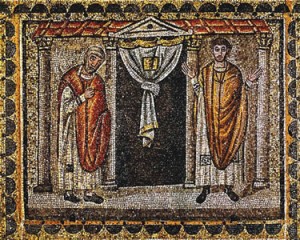Through My Most Grievous Fault
The Confiteor is one of the “younger” parts of the mass; it has been there only for about a thousand years. The probable origin is in a private prayer of the priest as he prepared in the sacristy. It is one of the few prayers of the mass that uses the first person singular, “I” and “my” rather than “we” and “us”. Until 1969 the prayer was spoken twice, once by the priest and then by the altar server or deacon and sub-deacon. Those of the congregation who were following the mass in a missal would join in the spirit of the prayer, but not say it aloud.
Even if the prayer was not audible the congregation knew it was being recited because of the gesture associated with it. At the words “mea culpa, mea culpa, mea maxima culpa” those reciting the prayer would strike their chest three times. The scriptural warrant for this action was the parable which Jesus told of the Pharisee and the Tax Collector (Luke 18: 9-14) - “the tax collector, standing some distance away, was even unwilling to lift up his eyes to heaven, but was beating his breast, saying, ‘God, be merciful to me, the sinner!’”
That parable and the Confiteor prayer have had such an impact on the world that “mea culpa” is a well known phrase, and that “breast-beating” means to make a public apology.
The 1969 reform of the liturgy after the Vatican Council was out to encourage “full, conscious, and active participation in liturgical celebrations which is demanded by the very nature of the liturgy, and to which the Christian people, a chosen race, a royal priesthood, a holy nation, a redeemed people have a right and obligation by reason of their baptism.” In the dialogue Mass the congregation not only responded to the priest, but also spoke some prayers along with him.
The idea of joining in the Confiteor is to acknowledge our need of God and the salvation offered. We do not need to remind God of what we have done – God knows. The intent of the prayer is to remind ourselves of our personal sinfulness. The tax collector of the parable “went home justified” because he knew that he needed justification. Complacency is the great enemy of true religion. Good people can shut God out of their lives because they think they are getting along fine under their own power. The temptations to pride are subtle and we need regular reminders of God’s goodness and our own tendency to muck things up.
The triple repetition (a “three-peat” according to sports fans) and the “breast-beating” gesture are part of the attempt to get us to hear and mean what we are saying. Salesmen and advertisers know the power of saying something three times. Attaching a gesture to the words, something that feels strange to New Zealanders, makes it more powerful again.
Next time you recite the Confiteor I invite you to make the breast-beating gesture (the rubric does not say how many times – once suffices, but three matches and enhances the rhythm of the words) and as you do so, listen hard to the words and put yourself in the place of the Tax Collector rather than the Pharisee.


 Entries(RSS)
Entries(RSS)